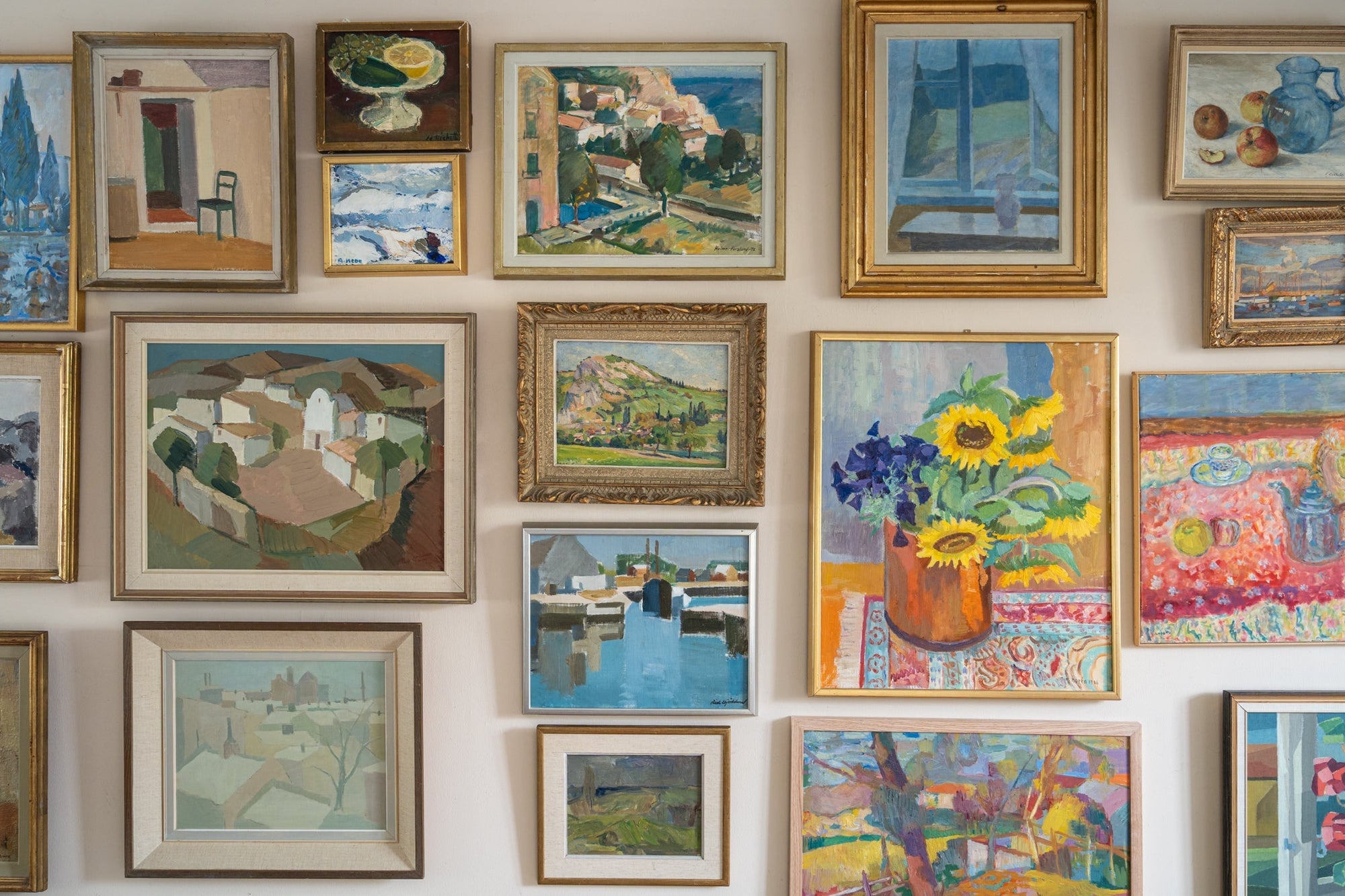THE LEANING LOOK: A NO-HOOKS, EFFORTLESS WAY TO STYLE ART
Scared to commit to the walls? Don’t worry, you’re not alone.
Whether you’re renting, indecisive, or simply prefer a more relaxed aesthetic, the leaning look is a low-effort, high-impact way to style art at home. No drills. No measuring tape. Just beautiful pieces casually propped in the right spot.

https://www.palmerandstone.com/
Photo by @snookphotograph
Why Leaning Works
There’s something inherently cool, and slightly rebellious, about leaning a painting instead of hanging it. It feels collected, lived-in, and a little bit unexpected. The first image in this series proves that Leaning Art can be just as striking as a full gallery wall, especially when layered thoughtfully.
Leaning works because it blurs the line between formality and ease. Unlike traditional hanging, it’s less about symmetry and precision, and more about mood and personality. This informal hanging style instantly softens a room, making it feel approachable and creative.
It also happens to be incredibly flexible. Want to rotate pieces seasonally? No problem. Still deciding where a piece truly belongs? Let it live in limbo, stylishly. By leaning instead of nailing, you keep the freedom to move, swap, and restyle without a single patch of wall filler.
Where to Try It
The beauty of leaning art is that it works in almost every corner of the home. If you’re just experimenting, start small. Here are some of the best places to explore:
-
Shelves and picture ledges — Perfect for shelf styling, layer multiple pieces together. Mix art with books, ceramics, or plants for a collected, personal look.

-
Console tables and sideboards — A medium-sized painting leaned against the wall can act as an anchor, grounding the other styling elements. Pair with a lamp or stack of design books for effortless interior styling.

https://www.studio-sanders.com/
- Fireplace mantels — Break up the symmetry of a mantel with one large original artwork off-center, then balance it with smaller accessories. It creates depth and visual interest.

Styling by @tessawatson
Photo by @ericpetschek
-
Floors and skirting boards — Large statement works feel bold, sculptural, and museum-like when leaned on the floor. This is one of the most dramatic art display ideas, though it’s best in spaces without small children or pets!

https://www.philipgorrivan.com/
-
Built-in joinery or cabinetry — If you have shelving, leaning art softens the structured lines and makes the space feel curated rather than rigid.

https://katierosenfeldandco.com/
Tips for Getting It Right
Leaning may be casual, but thoughtful styling ensures it still feels intentional. Here are a few Interior Styling tricks to make sure your displays look chic, not cluttered:
-
Layer in threes — When shelf styling or mantel arranging, play with threes: three different heights, three frame finishes, or three complementary colors. This creates rhythm and depth.
-
Balance the tones — Don’t overlook contrast. A warm-toned piece against a cool blue wall sings, while a dark canvas can pop against light joinery.
-
Add tactile elements — A lamp, a vase of fresh flowers, or a sculptural object placed slightly in front of the artwork grounds the display and makes it feel integrated into the room.
-
Mix frame types — Don’t be afraid to mix minimal frames with ornate, gilt ones, or even leave a piece unframed for contrast. Leaning lends itself well to this eclectic approach.
-
Play with scale — Oversized, original artworks leaned low can create drama, while tiny sketches tucked into a shelf feel intimate and personal.

https://www.jhinteriordesign.com/
Leaning vs. Hanging
Traditional hanging will always have its place. Leaning art offers something different: a sense of ease. While hanging often requires measuring, drilling, and commitment, leaning thrives on flexibility.
For renters, this can be a game changer. No need to worry about losing a deposit over nail holes. For homeowners, it’s a way to keep evolving your space without constantly repairing walls. And for anyone who loves to collect, it allows new acquisitions to slip seamlessly into rotation.
This informal hanging style also complements layered, lived-in interiors. In fact, many designers use leaning intentionally to make even high-end spaces feel approachable and personal.
Turning Shelves into Mini Galleries
One of the easiest entry points into leaning is through shelf styling. Think of a bookshelf not just as storage, but as a gallery. Lean small, framed oil sketches against stacked novels, place a larger canvas alongside ceramics, or prop an abstract piece behind a group of plants. The art becomes part of the vignette, rather than a separate element.
Because shelves are often at eye level, small and medium pieces really shine here. They’re close enough to be studied, yet casual enough to swap as the mood strikes. It’s one of the simplest and most versatile art display ideas you can try.

Making It Personal
The leaning look works best when it reflects you. Unlike traditional galleries, where spacing and uniformity often rule, leaning thrives on individuality. Choose pieces that resonate, mix mediums, and don’t be afraid of imperfection. A crooked vintage frame or layered corner only adds to the charm.
Think of leaning art as storytelling: your shelves, mantel, or floor become stages where different works interact. A family photo next to a flea market oil painting next to a sculptural vase, suddenly your interior styling tells a layered narrative about who you are.

https://www.hollandgreen.co.uk/
The Effortless Advantage
At the end of the day, leaning is about ease. No commitment required, no expensive hardware needed. Just the joy of experimenting, rearranging, and living with your art in a way that feels fluid and unpretentious.
So if you’ve been hesitating to start an art wall, consider starting smaller. Lean a piece on a shelf, prop one on a console, and let your collection grow into place naturally. Sometimes the best art display ideas are also the simplest.
Join our newsletter, The Palette, for first dibs + styling tips →







